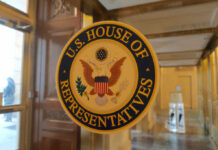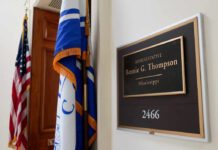
Supreme Court Justice Clarence Thomas remains steadfast amid a barrage of attacks from left-leaning media outlets and politicians. The critics are demanding his recusal in upcoming cases related to the Jan. 6, 2021 Capitol protests and President Donald Trump’s executive immunity claims — citing his wife Virginia “Ginni” Thomas’ political activities as the reason.
Mark Paoletta co-author of the book “Created Equal: Clarence Thomas in His Own Words” wrote in The Federalist “Mrs. Thomas played no role in any events following the 2020 election. She briefly attended the Jan. 6 rally but left before President Trump spoke and long before some of the crowd went to the Capitol.”
Historically justices have only recused themselves if there was a direct financial benefit or a substantial question about their impartiality. Justice Ruth Bader Ginsburg never recused herself from cases involving her husband’s law firm or decisions that cited her daughter’s scholarly work and other justices have made decisions on cases where their spouses had expressed strong opinions on related topics without facing accusations of ethical breaches.
Paoletta highlights the double standards in the current demands comparing the situation to past instances where liberal judges like Ninth Circuit’s Stephen Reinhardt refused recusal despite clear conflicts involving their spouses’ active roles in related legal matters.
Reinhardt’s decision was defended because a judge’s spouse can hold positions of advocacy without affecting the judge’s responsibilities.
Paoletta is absolutely correct that Justice Thomas is not obligated to recuse in Trump immunity case under well-established standards for recusal for lower courts, let alone for SCOTUS. https://t.co/SjSBVn4QGs
— Jonathan H. Adler (@jadler1969) April 18, 2024
The narratives suggesting Justice Thomas’ impartiality ignore the fact that the judge has been extremely professional during his time on the Supreme Court, and showing no violation of the clearly defined rules for recusal: “where an unbiased and reasonable person who is aware of all relevant circumstances would doubt that the Justice could fairly discharge his or her duties.”
It’s clear that Thomas’ critics are not aware of “all relevant circumstances.”




























